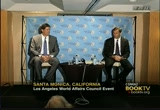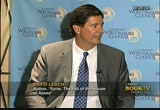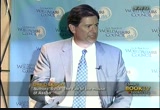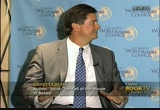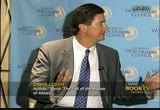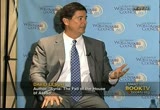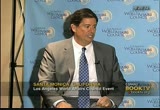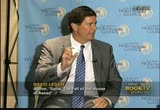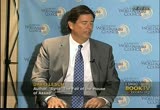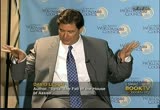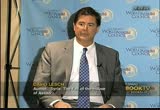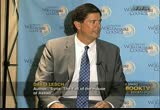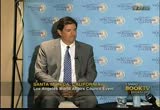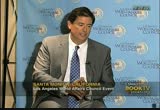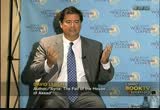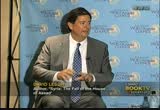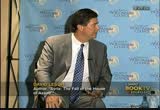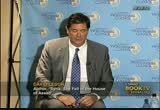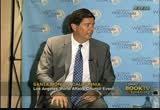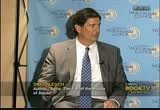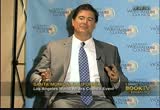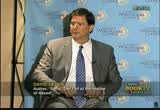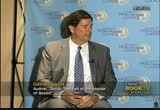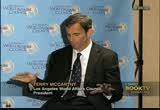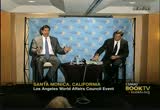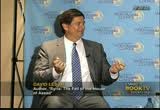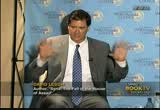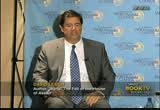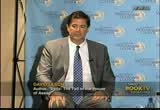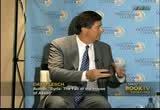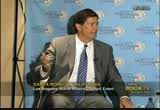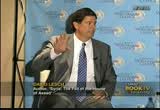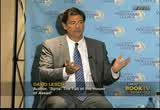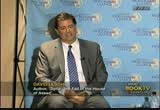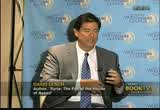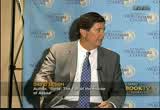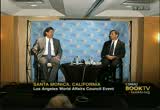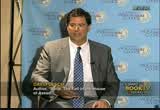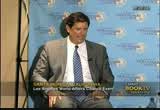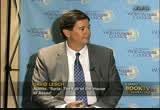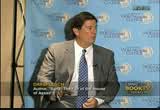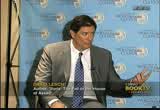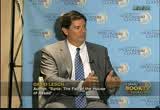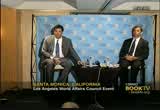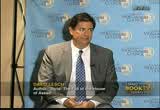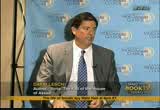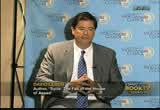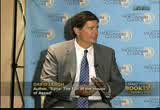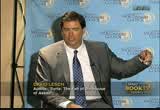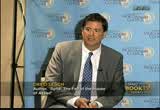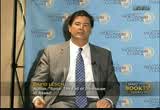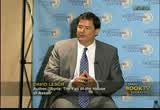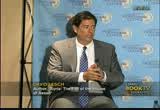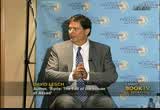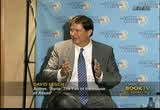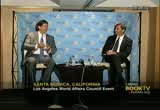tv Book TV CSPAN October 14, 2012 2:00pm-3:00pm EDT
2:00 pm
>> now on booktv, david lesch talks the rest of the shower al-assad in syria, the fates many in the west had you implement reforms in this country was silly and towards repression and violence in recent years. this is just under an hour. >> tonight, we have a program with david lesch. david is professor of middle eastern studies, middle eastern history at the university in san antonio, texas. david has been going to syria for 23 years. >> is going to be -- with 1989? 23 years. >> plenty of experience in that country. the most interesting and the reason i'm most excited to talk to us tonight, unlike a lot of people who talk about opinions, david actually got to know the shower al-assad, which is a unique perspective for an
2:01 pm
academic figure. david wrote a book in 2005, which held up great hopes for the future of syria under bashar, that he would be a reformer in syria after his father died was now discovered that it's not the case and is now written another book called the fall of the house of support. are going to talk about that tonight. my first question is going to be, when did you first meet assad and what was your impression? >> guest: i first met president bashar in 2004. i wanted to interview him because he was the atypical middle east dictator. he was a licensed up knowledge is, not groomed to be president and only was brought back into the grooming process and the political apparatus and his older brother who was being
2:02 pm
groomed guy than a car accident in 1994. bush are the the times in london getting the equivalent of an advanced degree in a gemology and he was brought back steadily raised in the state apparatus until he became president when his father died in 2000. so i thought that was an interesting story, that he was different from the typical middle east dictators at a steady throughout middle east history. so in 2002, i contacted a friend of mine, who happens to be the minister of education and he was in academia and the traveling to syria for years i met a lot of academics. being an academic myself. and bashar but a lot of these people into government. i don't know about academics being a government, but many people felt that the time that bringing academic technocrats, that maybe he would take the country in a different direction. so i contacted the minister for education and he contacted
2:03 pm
bashar. two years almost to the day later, the ambassador, the syrian ambassador of the united states the time called me a pen was also a friend and academic in the past, computer science at damascus university prior to becoming ambassador. he said david, it's on. i'd forgotten about this will mean. i said what is on? he said well, the president was to meet with you. and so i met with him in may and june of that you're extensively. i interviewed his wife in many other syrian officials. >> host: what was the first baby might? >> well, after the pleasantries and after i explained why wanted to do those, my first substantive substantive sentence to him was mr. president, you know i'm not in politics for s-sierra. you know i'm going to read this but can criticize you.
2:04 pm
he said that's fine. i know you'll criticize me. i know that because i'm not perfect and i know in the past you criticized my father's policy, but you are always fair and objective from their point of view. and then i told him, you know, mr. president, one of the worst things you ever did? with that? said he let it be known that you like phil collins music, the rockstar commingling. any a puzzled look in his face and said why did we let the sky in your? is asking questions. he said why? said because in the west disinformation contributed to this profile of him being a modernizing pro-western reformer. like western music, was an ophthalmologist, studied in london for 18 months. he's going to be completely
2:05 pm
different than his tax return father. and i said this created perhaps too high expectation the west of exactly what you want to do and which are able to do. >> where were your meetings held? >> they were held in paris places, usually in the presidential building, a very modest building in a district of damascus. i mean, very modest. it's a typical middle-class residential apartment building transformed into a president -- the quality presidential palace. it's not at all. that's where he mainly works. the street is blocked off. but we also met and what is called the people's palace, which was built by his father, this grand structure in the top of the mountain overlooking damascus. i mean, it is a palace and then some, but he hardly ever goes
2:06 pm
there no minis dignitaries. the only reason i met them there one time was he was meeting with mock mohammed in the shed, the iranian president. i met with him just after that. i think i can say this now considering this current circumstances, but i asked him, mr. president, what you think of ahmadinejad? he just rolls his eyes. he said thank god amini makes the decisions. i can say that now cause i'm probably never going to see him again, for chillier unfortunately. >> say how the relationship then went on. >> i got to know him very well. from the beginning, this is one of the sad things, actually got to personally like a man. it's very difficult, as you know, when you establish a relationship with someone like
2:07 pm
that and you want to get to know that person, but you have to try to remain even keep your distance. and sometimes that is tough. and i'm not a professional, as the water in doing that sort of thing. even for professionals is sometimes difficult. and sometimes to maintain the access you have to establish a personal relationship. so that was a little difficult. i tried tuning distance cannot check to be, but we retained a comfort level to the point where i got snippets of him as a person. when you interview figures like this, i mean, especially political figures, presidents, kings, queens, 90% of what they tell you is scripted, will appear in the newspapers over the next week. vicious stuff i've heard that
2:08 pm
goes in ear and out the other. it's not really interesting at all. but that 10% or 15% of what he tells me it's really dynamite. and that is when the guard is down. and i think we developed enough of a relationship. and he was always very welcoming and gracious, almost self-deprecating in the beginning, which is something that changed as time went on unfortunately, to the point where he did let his guard down at times. >> to julius i think it? i did. i did not meet his kids. all these interviews i had really two, three hours. so it covered a wide range of topics. she is very cosmopolitan, very impressive person, classic english accent. again, some in the people had high hopes and in the beginning. she was different. the first couple was different than in the past. usually this year and presidents
2:09 pm
wife stayed in the background. no one ever saw them. but she was out front. she was a champion of women's rights, a champion of trying to create a civil society organizations, although they were tied to the government. nothing much is independent. they profiled her just before the uprising, called her the rose of the desert, which they were very embarrassed about on the uprising. where is that person on? in whom people had high hopes, just like bashar al-assad. where did that person go? that's one of the saddest things about them because they really did develop a level of popularity in the country that wasn't insignificant. syria's difficult to engage popularity because people will come out in support of bashar al-assad and the government because they don't want to be
2:10 pm
seen as not supporting the government because the security services are all around. so it's difficult to see how genuine and insincere popularity is. but having been in the country quite a bit and gone around and talk to all sorts of people, i really did since he genuine popularity. but for me personally, one of the saddest things is they didn't leverage the popularity to implement true change, particularly at the beginning of the uprising. >> host: what did he talk about? >> guest: he talked about his upbringing. i mean, we talk different aspects, is that remain, which was fairly normal considering one of the things that i did was interview his elementary school teacher, primary and secondary teachers. they were not afraid, which is very telling in authoritarian
2:11 pm
system with equal, put it tator and power. they weren't afraid to tell me he wasn't very good at math for this particular subject. in fact, the parents had to switch schools because he was probably distracted by gross, so they sent him to an all boys school. if you compare that as i did in the first book in 2005, you know, with saddam hussein's son who basically threaten their teachers, who if they didn't give them a stay would put them in prison. at least that's the story i get there's no reason to doubt that. so this is one of the things that john was hopeful. you know, they try to get -- it was a privileged family. you can't be the son of a president cannot have a privileged lifestyle to some degree. but i interviewed his friends in a number of different people.
2:12 pm
and it wasn't orchestrated. it was pretty genuine but they were telling me. this is a pretty normal guy. he likes having friends. he enjoyed music that they like to go out. all these things that contribute to the profile that he was a fairly normal guy, good family man, all of these things. and that is what they tried to re-create. they live in a modest, upper-middle-class apartment building, where they live on one floor. mother lives on one floor right next door is the building. i put on shares because people next-door can look in the 90s the bathroom the bathroom and stuff like that. so they tried to re-create a fairly normal upbringing for their children. so again, all these things i learned the beginning impressed me and many other people, which is why think we had some hope in him that he would augment some real change.
2:13 pm
>> when did you start to see them change? >> personally in 2007. i think a major mattock way. i think i started to see it as early as 2006. and the reason is this. after the u.s.-led invasion of iraq, which was serious and opposed in syria was turning a blind life is not helping jihad discussed the area into iraq to kill u.s. soldiers and allied soldiers. there's a reason why they did that. they wanted the bush doctrine to say they were next on the hit list, so they were doing everything they could to help make this happen. there's one high-level syrian official told me later on, of course we were helping them across. you know what? we wanted you guys to kill them. that's why we wanted to go because we wanted these guys to kill you guys. we don't want them in our country. unfortunately they killed a lot of our boys. when he survived and
2:14 pm
particularly after the assassination of former lebanese rafik hariri, that was blamed on syria by most of the international community and the pressure just escalated exponentially after that against syria and people in late 2005 were counting the days for the assad regime. the expatriates, organization just waiting to move in one assad fell. but that created in hand and triumphalism and survivalism that very much reformed his view of the world and the response to the uprising that again in march march 2011 because it instilled in him the sense of destiny and righteousness that he survived to bash out the whiskey taken in and that he was on the right side of history. they really believe that.
2:15 pm
they have what i call a different conceptual paradigm of the world. it might be skewed. it might be off, but it's completely different based on their own history, based on their own experiences. they just have a different view of the nature of the threat. as a very paranoid view, very suspicious view of the outside world that are real because there has been just enough imagination to create power from the outside of the decade, certainly after syria became independent in 1946, between the british and the french and regional powers during the cold war. so that is their heritage. that's their experience. and then the arab-israeli conflict. that's how they view the world. they see the u.n. and any efforts they are suspiciously. they see the arab league
2:16 pm
controlled with the united states. so they very much be that the outside world is out to get done. and bashar absolutely feels that way. ever since 2005, there's nothing i can do that will satisfy them. so why even try? and i think this is why syria and the united states in the west before the uprising were walking past each other. they just have different views of the world and you had to be in damascus and you have to understand this view of the world i think in order to engage with them at a level they understand and respect. and it's a shame because as an american, you know, i wasn't doing this and for long time i was an advocate of improved u.s. senate relations. i wasn't doing this for syria.
2:17 pm
unless syria and the syrian people, it's a wonderful country. i'm an american. i thought this is us for the united states to develop a working relationship so they could cooperate to keep tejada said of iraq and so they could cooperate in developing an in arab-israeli negotiations unlikely to syrian israeli peace, that might lead to overall arab-israeli peace. one of the biggest missed opportunities and i've lamented almost everyday with syria and israel came so close to the peace agreement in 1999, 2000. they were this close and assad died. and something about a mistrust that caused problems, but they were this close. and if that occurred, there would've been after that a comprehensive israeli peace and i think the world will look much different. hezbollah would've been emasculated, iran would not have the influence in the heartland
2:18 pm
of the middle east. obviously the really palestinian dispute perhaps have been resolved. some say the palestinians would've lost their leverage. on the other hand, israel may have felt much more secure about it and been willing to make the concessions necessary. since i was one of the great missed opportunities. after all these reasons, i was hoping for some time, and bashar is very serious and he did say on his own vis-à-vis turkish mediation in 2007, 2008. they came very close again to. they were meeting secretly in syria. but the problem is negotiations take so long but something in the middle east to struts. something happened. if they are not done in two years time for years time, something happens, in this case the israeli raids on gaza at the
2:19 pm
time. so this is another reason why i was hopeful that this person, and he had people around him who are pro-west, but not everyone was, that advocated good relations with the united states. unfortunately, those people are marginalist right now. military solution is a wholly different cast of characters. >> as he saw him change, how was your relationship with him? visit also change? >> not so much. again, we have established a rapport. i think when i really saw him change into get out your previous question to finish the thought, was in 2007 in the quote unquote reelection, which was a referendum reelecting him
2:20 pm
to another seven-year term in 2000, 2007 reelection. he was the only one running for the referendum. and when i arrived in damascus and met him during the election, i saw something previously and that is the personality have been derived again. he issued the personality that grown up around his father. when he came to power hit the pictures taken down of those places about the manners and so forth and so on. he wanted to be this normal president. in 2007 passed and then some. and that told me then and there that he had changed, that the arrogance of authoritarianism, the arrogance of power. power is an aphrodisiac. i saw him become much more comfortable with power.
2:21 pm
that is not a bad thing except an authoritarian system if you become much were comfortable, you become an authoritarian ruler. and he was becoming more and more that i'm comfortable with that particular position working within the system instead of changing the system. and when i met with him, most of the time it was just me and him. we had a very kind of personal, emotional type of talk. i said, what do you think of all the banners and all the stuff? i half expected him thinking about the old bashar that he was a precious stuff. people are going nuts. what usually happens, syria tells, all the other companies and ministry said we better get on board and do this as well and just kind of mushrooms. it's pretty much have arranged. i really did expect him to just
2:22 pm
it. but instead, he said is in this great? they loved me. and at that moment, our member thinking to myself, and i write in the book, a resume for this audience were than any other, but he had what is called a sally field moment, she sat in front of the hollywood community and said you love me come you really love me. this was an affirmation. with him, he had been through such a test going, but it was a cathartic response in april response, the 10% that i was looking for. and at that time, i said to myself, you really believe in this, argue? your believing around you send about being of the country is synonymous in venice profit and at that moment, i remember vividly thinking to myself, your president for life, argue?
2:23 pm
and so, that was the most romantic and vivid representation of this change i saw in him, which again i think happened in the authoritarian systems, even the most well-intentioned authoritarian leaders. >> but he went one more step. mubarak generally believed that he was the savior for the egyptians, when they had people into her square, he didn't order his army to shoot. bashar has gone on to the dark side now. he has become the butcher of damascus. where does that come from? was that directly from assad? it is a coincident that when he was threatened he ordered an immediate attack on hamas. they killed about 20,000 people
2:24 pm
in one attack as you know, but most of 1882. he then had our problems. the shower has been different. he's engaged in the slower machiavellian but they killed about 20,000 people in 18 months. but is still 20,000 people dead or mubarak didn't kill 20,000 people. so how did bashar make that final step to the dark side, which is i will kill and i will kill until he no longer challenge because he must know is everyone in the alouette community must know, there's no going back. if they lose power, they will be slaughtered. so how did he make that final step to the dark side? >> welcome you hit on one of the main points, which is they see this as an existential contrast. this is something that there is
2:25 pm
no turning back on each side right now. for me, the answer to that is twofold. one, i think he really still believes from day one that he is saving the country, that he is protecting the country from chaos, even though his policies are in fact doing quite the opposite. but i really believe he thinks that way. i managed us from knowing how the syrians think and he thinks, and how righteous they believe they are in their particular policies with their problem. in fact, i had one well-placed theory and tony that they feel they've actually been restrained , but they want to really unleash the dogs they can and they haven't yet.
2:26 pm
and that is again part of the different conceptual paradigm. and secondly, this is just syria. it is a compulsive push button responds to unrest and this is where i think the biggest failing as in this whole thing. he has allowed security services leeway on autonomy. i write in 2007, where i was stopped at the airport interrogated and confiscated it was a list you don't want to be on end during the interrogation, the colonel twirled the gun in front of me. and you get guns pointed in your face, so this is not as
2:27 pm
threatening as it may seem because i really felt somewhat threatened. because they try to intimidate u.n. police here. you've had some guns pointed in your face. and anyway, i got out of that and i was going to see the president. but the left hand know what the right hand was doing. i finally convinced the colonel, i said call the office of the president, please. i firmly convinced him to understand would be worse for you if you didn't call and i was further interrogated or roughed up or whatever and sent back out than if you did call. so he called and he turned 50 sheets of white because he was appalled. there was a vision that he had done this. he became a best friend after that and he wanted my autograph and he gave me the sheet of paper that had my name on the blacklist, so i signed up for
2:28 pm
him. but when i went to see the president the next day come he asked how was your trip? is it other than the three-hour interrogation was fine. and he was upset and surprised and so forth, but i said at the end i said look, here i am, someone in the united states advocating better u.s. relations, trying to present. in a more favorable light. when i went back, was giving testimony. the u.s. hearing relations were. and mr. president, as politely as i could, mr. president, you have to get control of the security forces or as it's going to come back to hockey. and that's exactly what happened. the new circumstances of the arab spring and mohammed acted as they do when 15 children were
2:29 pm
graffiti on the roads in the southern syrian city of toronto, the new sense was the fire, lit the fire for the uprising in the area. it was that hubris that he allowed. you know, he knows that. i mean, he admitted to me, yes, they have access. but he indicated that it was a necessary tool in dangerous neighborhoods. and that is somewhat true, but also an excuse to maintain the existing and to maintain the regime in power. so i think it is a combination of those two things. he and his supporters, three things, protecting the position, they really do believe this is for the good of the country and they are saving and mandating legitimacy of the role.
2:30 pm
and i think our policies have been quite the opposite. m3 is just a compulsive push button responds, business as usual. when there's domestic unrest, you stamp it out a nauseous how things are done. and he went along with business as usual. >> i think the question questions on the floor. go right at. >> yes, i'd like to ask you how the shiites versus sunnis figure in this relationship. >> well, that is a complex question and it's become regionalized. this is where someone asked me if i could talk about korean. someone asked me to talk about iran and one of the complicating is a conflict as crisis as it becomes regionalized
2:31 pm
internationalized between diametrically opposed groups, regional level iran and its allies, hezbollah want to keep syria and assad in power. they are afraid of losing this conduit into the middle east and this conduit of arms in hezbollah and neighboring lebanon. saudi arabia, cotter, sunni countries, when turkish, to have misplaced the united states and others have been supporting the opposition to varying degrees. saudi arabia in many ways taken the lead because they are afraid of what they view developing in the middle east from iran through syria, which is 75% sunni, but the highlights are an offshoot of sunni islam. and in lebanon, the most powerful group is hezbollah shiite islamist organization. so you know, they want to break
2:32 pm
that up. the u.s. wants to make that outcome is the one survey data. so the fall of assad is desirable in that sense, although they don't want syria to implode altogether and breakup and cause a free for all the surrounding powers that would cause the regional and even international conflict, the danger in all of this. and inside syria, and has become very, very sick. the longer the conflict was on, the more sick. it is. because the other minorities come out 12%, 13%, christians 10% for the most part support the assad regime because of assad regime is very secularized and therefore will be a buffer on any conservative sunnis stayed from developing the sunni arab regime, that as you said
2:33 pm
2:34 pm
>> it is the very group that they want to see rise to power in some of these countries. in syria, it was a big dilemma. i have met with the israeli leadership on a number of occasions. it has been this way for years. he is in control of the country, but we know him, he is predictable, we have carried out some attacks and assassinations in syria, and they don't really respond in any sort of way if
2:35 pm
they can. there's so much power between syria and israel. you have half of the israeli theme,, we want them to have stability rather than chaos. or even worse, a radical sunni islamist state coming to power. the others other israelis have perhaps never liked us. particularly the support of israel over the years. they felt that, more importantly, it will emasculate and it will be a severe blow to iran's position. i think the israeli leadership has come around, especially once the international community, the
2:36 pm
united states came out officially last august of 2011, saying tha assad has st down. the israeli leadership has come around. we might as well accept that and tried try to do anything we can. not much. ultimately, it will undermine iran and hezbollah. >> we have a question i hear? >> yes, i have two questions for first, can you give any insight into tony blair's comments with george bush, microphone? why did they have such a favorable impression. they seem to really like him. >> i don't recall that one. i recall -- are you referring to the g-8 summit meeting in 2006?
2:37 pm
when president bush leaned over to tony blident bush leaned over to tony blair3 when president bush leaned over to tony blair and i can't remember what we used to call him. [laughter] if we can get the syrians to stop this, and he put a four letter word in a great double, situation. what is interesting about that comment, and bush is not like this. i asked him about that comment and i said, when you think about the comment by president bush? and i was half expecting him to say, oh, this is typical that the typical that. he said, i love it. because that means that they are thinking about me. they are worried about me. which that is part of syrian foreign policy. it's having some sort of leverage. it is a fairly weak country militarily.
2:38 pm
the leverage they have is the support of hezbollah, iran, hamas, the totalitarian territory -- but nothing to give up anything in the negotiations at the beginning. at the end, perhaps they will. and so that told me that it was very enlightening. it is important that syria is seen as though they have more leverage than they really have. >> do you think that iran is the filling his father stream? that was the whole thing that he went in and got people and now we have the same thing going on.
2:39 pm
>> i think if i would have asked him you understand what your father did in 1992, if i would have asked met earlier on, and he kind of avoided the question. but he tried to mark out a different path. i wonder if today he would say, you know, i understand what my colleagues are saying. now we understand in the face of domestic uprising supported by forces from the outside, working with unwitting accomplices on the inside -- that this is necessary. yes, it is bloody. this is a necessary evil. it is a necessary thing to keep the country together over the long-term. that is probably how he sees it. it is a shame.
2:40 pm
>> you think you'll ever unleashes chemical warfare? [inaudible question] >> just coming come you answered your own question. absolutely. [laughter] president obama has gone on record saying that that would be an aftermath. perhaps a more aggressive western response. it reminds me what vice president quayle said, he said something similar, he suggested that saddam hussein held back on the chemical weapons. and that could trigger an even more violent response. as was mentioned earlier, that
2:41 pm
would galvanize the international community. in the united states is already involved in that, and for good reason. you don't understand what is going on. their opposition is fragmented and divided. once before we kind of went in a bit blindly and it would kind of interference election year, and it is just different situations. much harder, much more complex, so many different ways it is complex. and so he knows that. so as long as there is no hamas or chemical weapons, i don't
2:42 pm
think they will use them unless it's the last threat to the regime about to go out. what saddam tried to do during the gulf war in 1991, trying to turn a persian gulf war into an israeli war, that is a dangerous shift. that is something that the israeli and u.s. policymakers are concerned about. the only problem with that -- when you unleash unleashes type of thing, you can carefully calibrated. you can't control it that well. especially with the g5 and the military groups that are dramatically supporting their regime. most of them doing this is to make a living and protect their communities. and also give the regime plausible deniability. i think it carries out the worst
2:43 pm
atrocities and you can't control that. you know, so, you know, i think that something could happen. when you unleash this type of situation -- and it's getting more violent, the syrians are starting to do things that they have not done in the beginning. they are starting to use the helicopters and bombs indiscriminately. to the point where it doesn't become galvanize in the western media as it has in the past. in the election coming convention, what happened in libya and so forth, something happens on a humanitarian moral level that compels the u.s. to act. that is what might happen. but we know they're very reluctant to do so. >> david, thank you very much for a very informative
2:44 pm
presentation. i think you brought up some great and important points about what is happening in the middle east versus the west of how we coexist together. some feel that this is outside people that are making this happen. we in america are saying that we are going to asia. swedes to the bad guys saying, okay, it's open territory. that leaves netanyahu feeling pretty isolated. >> in terms of israeli or? [inaudible] >> we are in a situation with your spring, the lack of progress on the israeli issue. this is a very tumultuous time,
2:45 pm
obviously. i think it's going to take a generation to play out. i think there are going to be convulsions unfortunately when there are these types of convulsions, there are not many -- there is not much incentive for that. and you know, i have always thought that for an air of an israeli force, but you have to have all the important players from the leadership, and the single leader be committed to it. you know, israel, the united states, syria, whoever. it all has to be on the same bill. that has rarely happened. for short periods of time, there has been progress during that time. unfortunately, something always happens, like the assassination
2:46 pm
in 1995. and then benjamin netanyahu came to power in 1996. and it was perez before that. saying that you have presence and power that have gone back and forth on the emphasis on these issue -- issues. we turn the page. people in the middle east live and eat and breathe this stuff, and it is amazing how little time that the presidential in a station entrance. what is the 10 minute briefing on this and so forth. i see u.s. policy adjusted readjusting the best they can. unpredictable situations and,
2:47 pm
you know, there is a lot -- in my views, there are a lot of activities in the wake of the arab spring. a lot of them are worried about what type of regime will come to power in egypt, tunisia, i would be less fearful of that. one of the things that i talked to some of the about, what happens when the anti-islam film came out of this. and, you know, it is a different conceptual paradigm looking at the reactions to this. it was a horrible film and it was terrible. it had a 5 million-dollar budget? really? somebody pocketed a lot of money. it was insulting and awful. but that is no reason to kill people. in the arab and muslim world, the response did get some genuine outrage.
2:48 pm
the muslim leaders are taking advantage of it. it reminds me of the hostage crisis in 1979 where the revolutionary guard held a 52 hostages in the u.s. embassy. that was as much a domestic political gain throughout the political movement. and there could be some extremist elements trying to make their mark in a situation where there is more political space. a few good things about authoritarian regime -- well, syria, -- they were about to have a protest and they said, get out. and they will go and it will get
2:49 pm
all their security agents, they will go to some companies and say all on board, we are going to protest the u.s., maybe do this and spray paint the windows. and then they know that that is it. but there isn't that now. these regimes are pretty weak. maybe in the long run that is probably a good thing that they are not the authoritarian regime. as far as the paradigm, remember this. and this is a shame. most of the people protesting this film were brought up in authoritarian environments where nothing was produced the most was sanctioned by the government. nothing. no film, no book, nothing. so they look at the world from their viewpoint. they think that this film has to be sanctioned by the u.s. government because that is what happens there.
2:50 pm
they have not experienced free speech or freedom of expression, which we happily enjoy in this country. they don't understand it. speaking of the revolution when carter hosted this in 1978. there were protests against them. there are protest in front of the white house every single day. these are anti-shah, and they concluded that the u.s. has abandoned the shah. because we would not allow this the most we were okay. they thought that this does not happen in transport unless it is orchestrated by the government. so that actually exercise the opposition. that is just a different
2:51 pm
conceptual paradigm of the world. >> one more question. >> can you explain the russian position with vladimir putin and bashar al-assad. does this have to do with america? can you point things out in the relationship? >> that is a very good question. on so many different levels, of course, they have an arms relationship with some practical means. many are much more important in syria -- they have portions that are important. it was not set a very well until recently when the russians upgraded it. so these are some of the practical aspects.
2:52 pm
in the larger sense, there is a lot of institutional inertia in relationships. syrians and the soviet union have a long-standing relationship. not always truthful, not always seen eye to eye, but they have a long-standing relationship, and there is a bureaucratic institutionalization of that relationship that is hard to change. diplomats and so forth, they have developed ties, and you just can't say, okay, we can stop this. in addition, vladimir putin is running foreign policy now. there were disagreements between him when medvedev was president. when he was president, he was one who was part of the security council in libya. vladimir putin was very critical of that. whether putin -- he started to
2:53 pm
assert himself in the foreign policy arena by the fall of 2011. and the russians had vetoed successive attempts by the u.n. security council to face more resolute action might syrian regime. that was the resolution to perfect them, nato and the u.s. used it in an authentic way. also, there is a vibrant tangible spirit. they see the protests that occurred in russia earlier in the year against vladimir putin. they see the hand of the united states and us. that is why they picked up some of the ngo organizations supported by the united states.
2:54 pm
so vladimir putin sees his position or is similar to that. they don't like change. they feel that u.s. intervention in iraq has failed. and they made the entire middle east worse. they don't want to see it happen again in syria. of course, it protects their own interests. it was one of the last areas in the middle east. but they have to be careful. i mean, the united states stuck with shah and one. and we incurred the wrath of the. therefore you go down without sure. how long we stay with us? but this has become an
2:55 pm
international power between the united states and russia. russia is asserting itself and is writing this nationalist response against u.s. influence that has been going on for a decade now. so i don't see a change anytime soon. >> this has been really fascinating. the most interesting metaphor that you have. it was his brother, and his brother, of course, had a bloody end. but in his brother became the godfather and that got worse and worse. that is the most spine chilling thing. washington -- it's getting worse and worse. >> the shah is him at the end of
2:56 pm
the godfather as well. saying that he's going to make it right. at the end of that, he talked about that. >> thank you all. >> thank you very much. it is great to have you. [applause] >> is there a nonfiction author or book you would like to see featured on booktv? send us an e-mail at booktv at these e-mail addresses. booktv.com. >> this is a book about my childhood and i have grown up in colorado. i grew up in nevada about 7 miles from the nuclear weapons plant. then in 1969, we moved to a subdivision called by novell, which was closer to the plan.
2:57 pm
develop 3 miles away. my sisters and i had an idyllic childhood. we had horses and dogs and spent a lot of time outdoors riding our horses roam a field. we had a lot of fun, and we had no idea of the environmental contamination that was happening in the area. a number of different things in the environment and we had no idea. later, like many children in my neighborhood, i worked at the plant myself and got a sense of what it was like to be on the inside. when i came home from working at rocky flats and turned on the television, there was a show on nightline that was talking about
2:58 pm
what went on at the plant. it was the first time i had an understanding in how extraordinary the contamination was. >> it was on that date but i decided to quit my job at rocky flats. the day i decided to quit was the day i decided to write a book about it. and i wanted to write a book that reads like a novel but is very heavily footnoted. check on the back and see where the information comes from. so i wanted to write a story from the perspective of all of the different kinds of people whose lives have been occupied. not as residents like me and my family, but workers at rocky flats. thousands of people in colorado and beyond who are affected by rocky flats.
2:59 pm
another reason we were talking about the story is that we continue to deal with the legacy production of this country. the environmental industry and also the cultural legacy of how important this plant was in the way it affected people -- people that weren't aware at how they were being affected. when i worked at the plant, it was common for workers to refer to them as cold war warriors. for the people that grew up in a rocky flats, we were also warriors, but nobody told us that we didn't know what was happening at the plant. the plant was operated by chemicals, and we thought they were making household cleaning supplies. my mother thought they were making scrubbing bubbles. it was not apparent what actually happened.
141 Views
IN COLLECTIONS
CSPAN2 Television Archive
Television Archive  Television Archive News Search Service
Television Archive News Search Service 
Uploaded by TV Archive on

 Live Music Archive
Live Music Archive Librivox Free Audio
Librivox Free Audio Metropolitan Museum
Metropolitan Museum Cleveland Museum of Art
Cleveland Museum of Art Internet Arcade
Internet Arcade Console Living Room
Console Living Room Books to Borrow
Books to Borrow Open Library
Open Library TV News
TV News Understanding 9/11
Understanding 9/11
